Some of y’all have asked for me to write, from time to time, about what I’m reading. So here goes. Keep in mind that I have a notoriously short attention span, so I tend to read multiple things at once. Keep in mind also that these books are not, necessarily, books I recommend or approve of (at least not yet). They’re just books I’m reading at the moment.
The Professor and the President: Daniel Patrick Moynihan in the Nixon White House, by Stephen Hess (Brookings) [Amazon, B&N]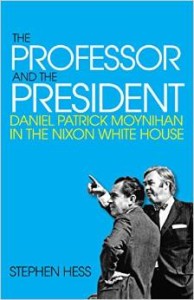
Maybe it’s because I was born in the final days of the Nixon Administration, but I’ve always found Nixon fascinating. And Pat Moynihan is one of the most delightfully quotable public figures in the last generation. This book details their unlikely relationship, by one who knew both before they knew each other. The book explores the controversial Moynihan Report and the racial disruptions of the late 1960s and early 1970s. It also points out the human foibles and ego collisions that happen anywhere, whether in the West Wing or on a church staff.
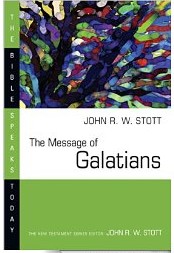 “Lectures on Galatians” by Martin Luther (1535) in Luther’s Works, vol. 26 (Concordia) and The Message of Galatians by John R.W. Stott (InterVarsity) [Amazon, B&N]
“Lectures on Galatians” by Martin Luther (1535) in Luther’s Works, vol. 26 (Concordia) and The Message of Galatians by John R.W. Stott (InterVarsity) [Amazon, B&N]
Sometimes I like to do my devotions by reading large swaths of Scripture in a single siting to get the flow of the argument. Reading 1 Samuel, say, or Colossians macroscopically can be helpful for me. Other times, though, I like to read slowly and marinate on a particular book. That’s where I am now with Galatians. I almost never read commentaries in conjunction with my daily Bible reading, but this time I am. Stott is brilliant, punchy, and right to the point. And this commentary is, I think, perhaps the highpoint of Luther. As I read him, I think, “He really gets it.” The issues he identifies are still the ultimate matters every Christian must face. And he makes me love the gospel more.
Coming Out Christian in the Roman World: How the Followers of Jesus Made a Place in Caesar’s Empire, by Douglas Boin (Bloomsbury) [Amazon, B&N] 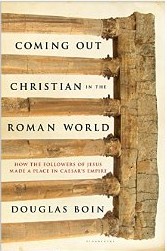
It is hard to say, but this just might be the dumbest book I’ve ever read that wasn’t self-published and mailed to me. The author downplays persecution of the church in the empire, while providing no evidence that Christians fabricated the martyrdom many faced. At the same time, he seems to believe it is groundbreaking to show that some claimed Christian identity while at the same time engaging in Roman civil religion and cultic exercises. Of course they did. Significant portions of the New Testament epistles are devoted to identifying and rebuking such. You’re much better off reading Robert Louis Wilken’s magisterial work, The Christians as the Romans Saw Them.
Tr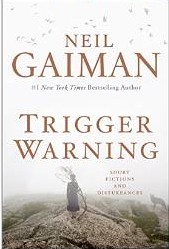 igger Warning: Short Fictions and Disturbances, by Neil Gaiman (Morrow) [Amazon, B&N]
igger Warning: Short Fictions and Disturbances, by Neil Gaiman (Morrow) [Amazon, B&N]
Gaiman is one of the most creative, fun writers of science fiction and fantasy out there today. This work is a collection of short stories that explore the hidden “triggers” everyone carries around.
He writes: “The past is not dead. There are things that wait for us, patiently, in the dark corridors of our lives. We think we have moved on, put them out of our mind, left them to desiccate and shrivel and blow away; but we are wrong. They have been waiting there in the darkness, working out, practicing their most vicious blows, their sharp hard thoughtless punches into the gut, killing time until we came back that way.”
Come to think of it, I guess it’s appropriate to read Gaiman and Luther at the same time, since that’s precisely what the Reformer was grappling with. The stories are fascinating and well-crafted. But I will hum through the rest of the book, “The Prince of Darkness grim, we tremble not for him…” That’s a trigger warning, with punch to it.
Buckley and Mailer: The Difficult Friendship That Shaped the Sixties, by Kevin Schultz (Norton) [Amazon, B&N]
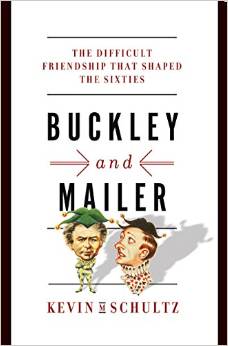 This is one of those books that, before I started it, I would flip it open to some random spot and find myself drawn in. Before I would know it, five or ten minutes would be gone. Buckley, of course, is the founding father of the modern conservative movement. Mailer is something of a poet laureate of the 1960s sexual revolution. As I write this, I’m starting to realize that I like books about unlikely friendships. Maybe that’s because I have so many friendships with people with whom I fundamentally disagree. The book is, so far, an insightful look at the psychology of disagreement, and of friendship. Along the way it provides a good cultural history of the roots of today’s culture-war flare-ups.
This is one of those books that, before I started it, I would flip it open to some random spot and find myself drawn in. Before I would know it, five or ten minutes would be gone. Buckley, of course, is the founding father of the modern conservative movement. Mailer is something of a poet laureate of the 1960s sexual revolution. As I write this, I’m starting to realize that I like books about unlikely friendships. Maybe that’s because I have so many friendships with people with whom I fundamentally disagree. The book is, so far, an insightful look at the psychology of disagreement, and of friendship. Along the way it provides a good cultural history of the roots of today’s culture-war flare-ups.
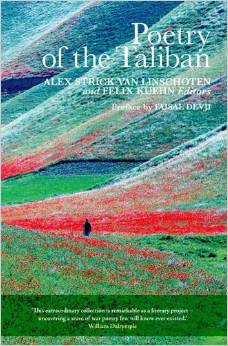 The Poetry of the Taliban, Alex Strick Van Linschoten and Felix Kuen, ed. (Columbia) [Amazon, B&N]
The Poetry of the Taliban, Alex Strick Van Linschoten and Felix Kuen, ed. (Columbia) [Amazon, B&N]
I know, I know. I saw this referenced somewhere and at first I thought it was a parody, along the line of Springtime for Hitler. But, no, it’s actual poetry from Islamic fundamentalists in Afghanistan. It ain’t Proust. But these poems give me a bit of insight into the mindset of these authoritarian warlords and into how they view the West and, more importantly, Christianity. Reading these poems forces me to pray more diligently for my brothers and sisters in Christ in the Islamic world, and for those whom I pray one day will be.








